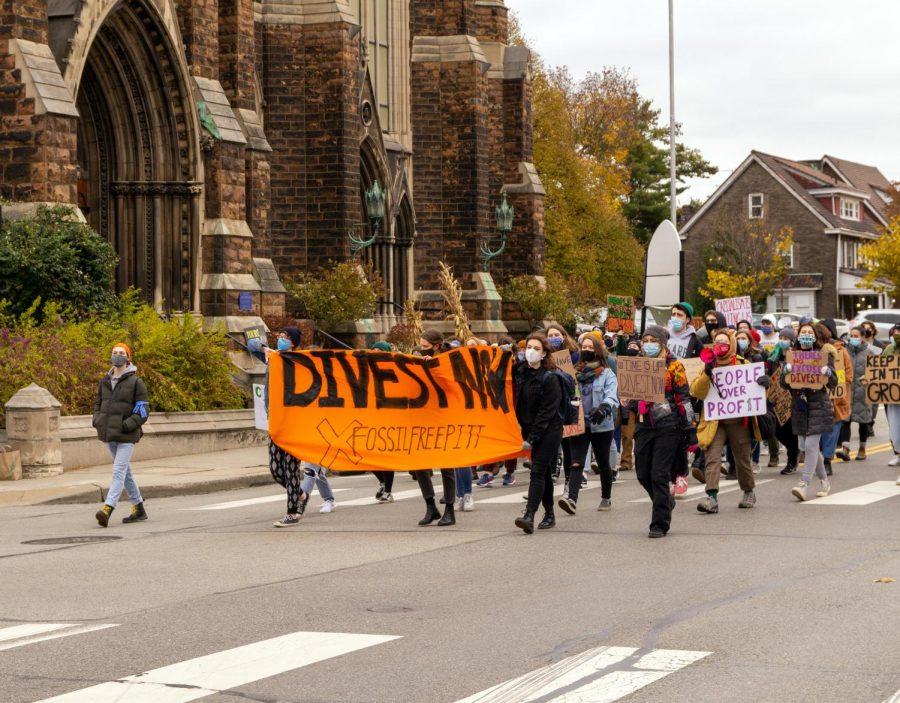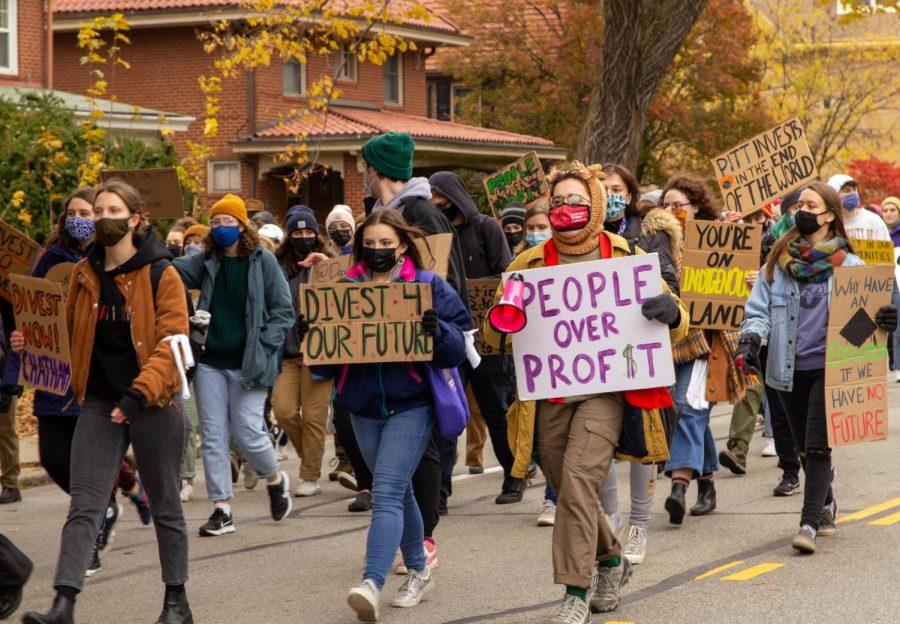Students at Pitt, neighboring universities demand fossil fuel divestment at climate march
John Blair | Senior Staff Photographer
Pitt, Chatham and Carnegie Mellon students walk down the street with a banner that reads “Divest Now” during Saturday’s “College Climate March.”
November 15, 2021
Dozens of students from three local universities — Chatham University, Carnegie Mellon University and Pitt — gathered on a snowy Saturday afternoon to protest continued fossil fuel investment by their schools.
Fossil Free Pitt Coalition, Divest CMU and Green Team Chatham organized a “College Climate March” on Saturday and marched from Chatham’s campus, through CMU’s campus and eventually ended at the Cathedral of Learning. About 50 attendees carried signs donning slogans such as “divest now,” “people over profit” and “keep it in the ground.”
The climate march — which is the first event organized by the three separate student groups together — highlighted the three universities’ investment in the fossil fuel industry. At various stops along the march, student representatives from the organizations gathered the crowd to verbalize their demands, such as fossil fuel divestment, climate justice and tangible sustainability work on campus.
Kanika Vaghela, a sophomore statistics and economics double major and member of FFPC, said while Pitt is working on a Climate Action Plan and promised to be carbon neutral by 2037, there needs to be a tangible plan which does not reward gradualness over immediacy.
“Honestly as soon as possible — 2037, it’s just too late,” Vaghela said. “We’ve been calling for divestment since 2014.”
FFPC has continuously called upon the University to divest from the fossil fuel industry through other marches and even a billboard erected temporarily in February. Vaghela said it can be difficult to even pursue an open conversation with administration due to the lack of transparency regarding board of trustees meetings.
As students await Pitt’s upcoming Climate Action Plan, Vaghela said FFPC is also concerned with conflicts of interest of several board members. According to social media posts on Oct. 29, FFPC claims four board members — Thomas VanKirk, Robert Agbede, Roberta Luxbacher and Thomas Barbour — have ties to the fossil fuel industry and should “abstain” from voting on divestment because of this.
“There are members that have not only direct ties, but also indirect ties with different fossil fuel industries, like Exxon Mobil,” Vaghela said.
MacKenzie MacFarland, a senior chemistry major at Chatham and member of the Green Team, said while Chatham has expanded their sustainability program on the Eden Hall campus over the past 10 years, it masks a pressing issue.
“It’s just performance that distracts from the fact that Chatham still has 5% of its $486.5 million endowments in fossil fuels,” MacFarland said.
Although the administration at Chatham has been communicative with student activists about divestment demands, the school’s small size hinders the divestment process, according to MacFarland.
Chatham University pledged in 2017 to continue divesting its $80 million endowment from fossil fuel resources, and to utilize an external financial advisory that is specifically focused on green technology. But these changes are not expected to fully divest Chatham from fossil fuel companies, and 5% of the endowment is still concentrated in these stocks.
Nicklaus Smith, a senior social and political history and environmental and sustainability studies major at CMU, said a 2019 report by STARS, a sustainability tracking, assessment and rating system, revealed that 98% of CMU’s $2 billion endowment is not considered sustainable.
CMU’s external funding by oil companies and the Department of Defense — one of the world’s top greenhouse gas emitters — is also cause for concern in the fight against the climate crisis, according to Smith.
“CMU received $170,000 from Exxon Mobil in 2019,” Smith said. “STEM programs are more oriented towards getting students to find jobs that are either in the fossil fuel industry like Chevron, Exxon Mobil or BP or big oil companies.”
Sophie Vincens, a first-year environmental engineering and engineering and public policy major at CMU, mentioned that much of CMU’s funding comes from the Department of Defense. While some of this funding is geared towards cybersecurity, other funding is funneled into programs to design drones, different weaponry and evaluate weapon efficiency.
“We are not only working with them [Department of Defense] to create weapons that harm people, but also we are allowing them [Department of Defense] to continue fossil fuel exploits,” Vincens said.
According to Smith, although CMU has attempted to discuss sustainability by creating an internalized sustainability audit in 2019, which evaluates the university’s compliance with the United Nations sustainable development goals, it is not cause for celebration.
“It doesn’t deliver any kind of benchmarks or consistent progress reports that we can make in order to quantify how we’re adhering to those goals,” Smith said.
Though the organizers centered much of the climate rally around divestment, all three organizations stressed the importance of climate justice, and how local universities should play a role in this ongoing process.
MacFarland said full divestment must also be accompanied by reinvesting in local communities — such as McKeesport, Braddock, Clairton and McKees Rock — that “have been shouldering the burden of fossil fuels for generations.”
As local universities continue to grapple with the climate crisis, there needs to be a clear illustration and a concerted effort to center climate justice, according to Vincens.
“It should look like having equal opportunities for all people to be alleviated from environmental degradation,” Vincens said. “Whether that be working in communities that face kind of worse environmental conditions than others or creating a system and practices within the university that not only lowers our carbon output, but also teaches all the students that go here what climate justice is and how it can affect them and how they can implement it in their own lives.”









